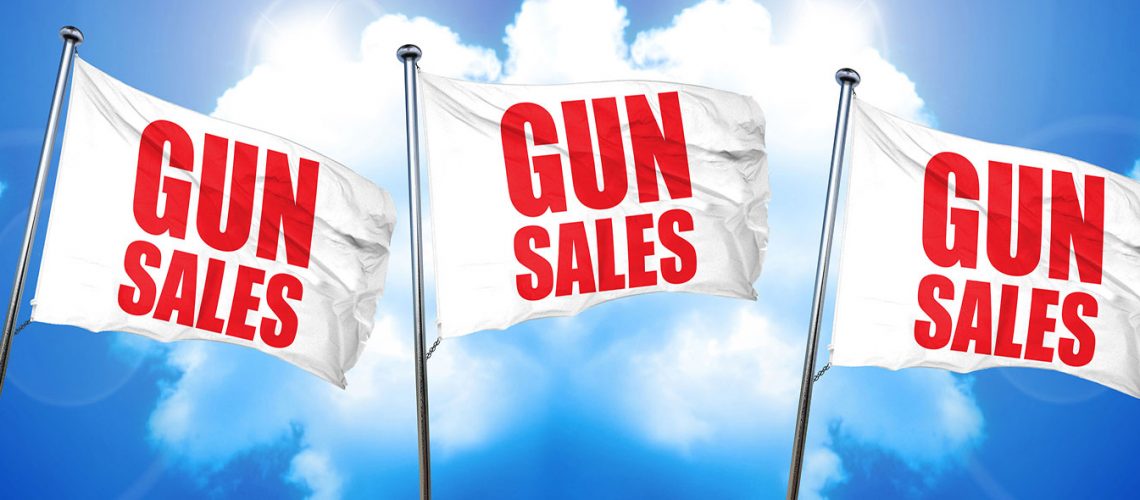Just because someone else has owned and used a gun doesn’t mean it won’t be a fine firearm for you. Kind of the same principle as a used car. But there are a few things to keep in mind when considering the purchase of a used gun.
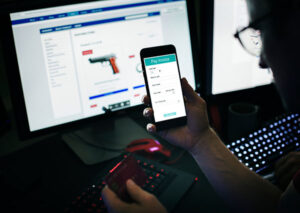 Where to Find What You Want
Where to Find What You Want
Like everything else people want to buy or sell, the internet has become the world’s trading post. However, along with all the advantages—selection, selection, selection, and sometimes price—come the traditional disadvantages.
Chief among them that you can’t actually see, feel, or inspect the firearm.
And then there’s extra fees like shipping, and an FFL transfer. Any savings you might experience in the cost of a firearm could easily be wiped out when shopping online as opposed to a good, old-fashioned gun shop. Odds are, you’ll be headed to that shop anyway to pick up the firearm through the legal transfer process.
One thing that online shopping does do very well, however, is educate a potential buyer as to the current market value for a particular used firearm. After visiting a dozen or so websites in search of the item or items you’re looking for and you’ll be able to recognize a value, the standard price, and an excessive price almost immediately. Finding a gun online can also be great when you are searching for something very specific or unusual that is not commonly on store shelves.

 From Your Neighborhood, To Your Town, To The Next Town Over
From Your Neighborhood, To Your Town, To The Next Town Over
For some, nothing but an hands-on shopping experience will do.
So, if it’s not going to be the internet, then it’s going to be in your immediate vicinity. Or, however far you’re willing to go to get what you want.
That means bona fide gun shops, gun shows, or a sale from someone you know, someone that someone you know knows, or newspaper classifieds, online postings, and the always popular word of mouth.
Whether it’s a range with a gun shop or any type of private seller, the ability to actually test fire the weapon resides on a scale from “Of course” to “No way on earth”. But even that is a better chance than you have with the internet.
Can You Take A Test Drive?
Maybe you’re considering purchasing a gun you’ve fired before—or have the opportunity to fire and handle. Be it a gun that a friend or someone you know currently owns and wouldn’t mind parting with.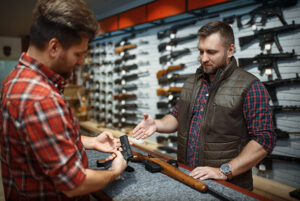 That’ll allow you to do a once-over on your own. See if you like the feel of the firearm. The way it fires. If it seems well-maintained. Run through the fire-control functions. On semi-auto pistols, how’s that slide? Smooth? If it’s a revolver, does the cylinder spin properly and line up exactly with the bore?
That’ll allow you to do a once-over on your own. See if you like the feel of the firearm. The way it fires. If it seems well-maintained. Run through the fire-control functions. On semi-auto pistols, how’s that slide? Smooth? If it’s a revolver, does the cylinder spin properly and line up exactly with the bore?
For long guns, the actions and controls should also operate easily and precisely. If a weapon has modifications or enhancements, this is a good time to investigate them to see if they actually improve the firearm—or if they take it further away from the factory version you were expecting.
If someone’s interested in selling you a firearm, and they’re willing to let you put the firearm through its paces—take them up on it! Make sure you’re getting something worth buying in the first place.

There Are Used Guns, And Then There are REALLY Used Guns
Naturally, when you’re buying a used item, it’s most desirable to have it be as close to new as possible in terms of use and condition.
Common sense should apply when evaluating just how close—or far away—a gun is from brand new.
 Does the firearm function as it should? Do all the moving parts unerringly perform their task? If not, the gun isn’t just used. It’s broken, and you’ll be repairing it. Asking “Why are you selling it?” is not rude or unusual, and may expose subtle issues that were not immediately obvious.
Does the firearm function as it should? Do all the moving parts unerringly perform their task? If not, the gun isn’t just used. It’s broken, and you’ll be repairing it. Asking “Why are you selling it?” is not rude or unusual, and may expose subtle issues that were not immediately obvious.
Check the condition of the outside of the firearm. Blemishes and scuffs aren’t necessarily disqualifying, but are they symptomatic of a defect? Has the gun been damaged due to a firing issue or improper treatment that is evident by a cracked barrel or stock?
Inspect the gun as thoroughly as you possibly can. View the firearm from every angle and facet you’re able or permitted to from grip or stock to muzzle. Dry-fire the weapon if possible, too. Always ask before dry-firing (on most guns it is completely fine, but on some older models it may cause unnecessary wear). Of course, triple check that the gun is completely unloaded and pointed in a safe direction before dry-firing.
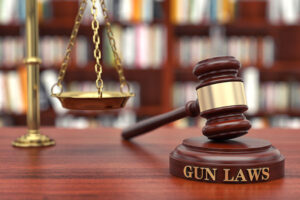 There Could Be Legal Issues…
There Could Be Legal Issues…
While a private sale could be viewed as simpler than an internet or gun shop purchase, you’ll want to make very sure you know your local and state regulations in this regard.
For example, in Texas, a private sale for cash is fine. However, in states like Michigan or Washington It’s not that easy.
Firearms Legal Protection members can begin their research in the “MyFLP” mobile app, which lists many state and federal laws related to transport and transfer. Your safest bet is to speak with a legal expert in your state familiar with what you’ll need to do to make sure everything is legal and above board.
A Few General Rules:
- If someone is not willing to provide a legal ID, do not complete a gun transaction with this person. There may not be a legal requirement to show ID, but it is a bit suspicious to refuse it.
- Use a bill of sale—this serves as a receipt to prove that the transaction happened. (Many different templates can be found online. Some states require a bill of sale, many don’t, but it’s never a bad idea.)
- Do not complete a gun transaction with anyone you suspect is a felon, or other “prohibited person”.
- Complete private party transactions in daylight, in a public or visible space. With online transactions becoming more common, many police stations and other facilities have designated “meet up” spots for safe transactions.
- If you live in one of the few states (you probably know who you are) that requires registration, make sure you are up to speed on registration and transfer requirements.
- Asking to see a carry license is certainly not a requirement, but it can help put you at ease about the individual who is selling a who the firearm.
- Be sure it is legal for you to own the firearm in your state (For example, a minor can legally shoot or possess a handgun in may instances, but cannot legally buy one)
- Consult with an expert or dealer before offering to buy an NFA-restricted item (short barreled rifle, silencer, destructive device, etc).
- Avoid shipping firearms to individuals—anything out of state generally needs to go to an FLL, not to an individual. There are some exceptions, but be careful.
- A firearm that has a serial number filed off is a red flag! While there are specific cases where firearms don’t have to have serial numbers, removing the serial number from a firearm will always make it illegal.
- Make sure the transaction is happening in a place where both parties (and guns) are allowed to be. Even walking into a post office with a firearm is a federal crime.
Avoid out-of-state or non-resident transactions. There is almost always a way to do this legally, but it is often more complex than a local transaction with a resident of your home state.

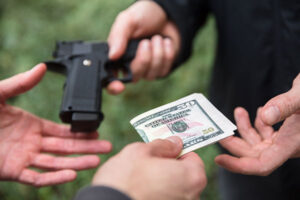 Don’t Pull The Trigger Unless You’re Sure
Don’t Pull The Trigger Unless You’re Sure
Let’s face it. A used gun is up for sale because someone didn’t mind getting rid of it.
It could be they just need the money more than the gun. It could be they’ve had the fun and pleasure of owning it and have moved on to something else. It could also be that there’s something fundamentally wrong with the firearms and they’re trying to transfer that problem to someone else.
Someone else like you.
Do your due diligence. Ask around. Research. Don’t be bashful about asking for test firings, inspections, or any other information you can get. Then, just your own judgement.
If you’re practiced that due diligence, sure, you’ll have a used gun. Which hopefully will be well-used and enjoyed by you.
